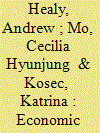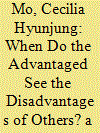| Srl | Item |
| 1 |
ID:
154906


|
|
|
|
|
| Summary/Abstract |
We consider the thesis of Alexis de Tocqueville (1856) that economic development and increased mobility may generate political discontent not present in more stagnant economies. For many citizens, as they become aware of the potential for improved living standards, their aspirations may increase faster than actual living standards. Expanded opportunity may then paradoxically result in dissatisfaction with government rather than greater confidence. We develop a formal model to capture Tocqueville’s (1856) verbal theory and test its predictions using a 2012–2013 face-to-face survey experiment conducted in Pakistan. The experiment utilizes established treatments to subtly manipulate either a participant’s perceptions of her own economic well-being, her perceptions of society-wide mobility, or both. As predicted by the theory, political discontent rises when declining personal well-being coincides with high mobility to create unrealized aspirations. The results thus identify the conditions under which expanded economic opportunity can lead to political unrest.
|
|
|
|
|
|
|
|
|
|
|
|
|
|
|
|
| 2 |
ID:
162206


|
|
|
|
|
| Summary/Abstract |
Are there mechanisms by which the advantaged can see the perspectives of the disadvantaged? If advantaged individuals have prolonged engagement with disadvantaged populations and confront issues of inequality through national service, do they see the world more through the lens of the poor? We explore this question by examining Teach For America (TFA), as TFA is a prominent national service program that integrates top college graduates into low-income communities for two years and employs a selection model that allows for causal inference. A regression discontinuity approach, utilizing an original survey of over 32,000 TFA applicants and TFA’s selection data for the 2007–2015 application cycles, reveals that extended intergroup contact in a service context causes advantaged Americans to adopt beliefs that are closer to those of disadvantaged Americans. These findings have broad implications for our understanding of the impact of intergroup contact on perceptions of social justice and prejudice reduction.
|
|
|
|
|
|
|
|
|
|
|
|
|
|
|
|